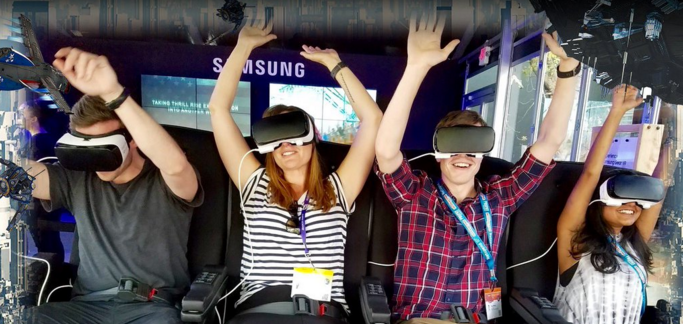Is Virtual Reality the Future of Movies?
28 July 2016By Nora Blanco
A few months ago Google launched 360, a video channel for short films in virtual reality.
Some are predicting that this is the future of cinema. Although the appeal of experiencing a new technology is always a good hook, I personally don’t think VR movies are so clearly superior that they would replace cinema as we know it today.
A couple of months ago I took part in a demo of Samsung’s VR gear at SXSW. Sitting in a mechanical chair, equivalent to a roller coaster’s but equipped with high fidelity headphones and a pair of Samsung goggles, I experienced first-hand, for the first time, virtual reality in the Oculus Rift era.
In the first few seconds of my ride, the temporal proximity to the room, the people who sat beside me, and the voice of the person who guided us through the experience were still all too real. But within seconds all that was the outside world started to recede until it disappeared completely. In a few moments I felt totally immersed in a roller coaster ride. I felt the acceleration, I felt dizzy and I even screamed during one of the steepest falls.
The one strange aspect of the entire experience was that I was not able to see my own body. For example, throughout the experience there was no record of my feet, which were supposedly there, hanging from the chair, meters above ground. There was also no representation of the body of my seatmate. When I looked in his direction, to where seconds earlier he had sat down, I only saw a void.
The trip lasted just a couple of minutes, but the experience was extremely real. I left my seat dizzy and tired, and worried about my personal items, which I had left in a backpack in front of my seat.
Could this be the future of cinema? I don’t think so.
First, the fact of having to move, having to turn your neck to change your point of view is not natural, comfortable or easy to do for an entire hour or more. We are accustomed to a certain level of comfort: we throw ourselves on the couch and stay put, we sit in front of the screen in the theatre, and we make no bigger effort than moving our hand from the popcorn bag to our mouth, all while enjoying the story.
Our ability to focus on multiple points of view at the same time offers the Virtual Reality audience greater freedom to interact with the narration; but perhaps this would be a distraction to those who have been raised following a linear narrative, as we have experienced since Hellenic times. How would the director of a thriller guide us if he or she is not able to control each one of the details s/he planted in the story, the precise rhythm, the right timing?
Perhaps VR is suitable specifically for action movies, where car chases, explosions, and action unfold at extreme speeds, and do not require the nuance of certain narrative details, gestures, words or looks — fundamental ingredients of dramas, thrillers, comedies and other genres.
Will this be the end of the romance film, Oscar award-winning dramas, comedies? Are we poised to watch a million versions of The Fast and the Furious?
Google’s shorts were made to be watched with virtual reality glasses, but they are also available on YouTube and can offer you a rough idea of how this new form of entertainment works in real time.
Did you like this article?
Tell us what you think! or share on Facebook, Twitter and email with the icons below.

